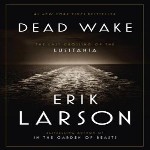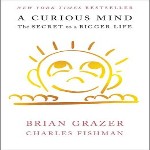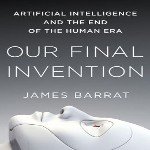MAY 2015
AUDIO BOOK REVIEWS
by Jonathan Lowe
 |
The
Lusitania was sunk in May 1915 by U-20, despite
its being the fastest liner afloat. British intelligence
was tracking the ship, bearing a number of American
women and children as it left New York for Liverpool,
but never told anyone about it. And no ships were
sent to guard it. Could it be they wanted it sunk
to bring America into WW1? The subject has been
covered before, but this is the first time in such
a literary way, with some new viewpoints never previously
explored. It is 100 years ago now, which is one
of the reasons that Eric Larson
wrote DEAD WAKE. He did extensive
research on the subject, including looking at mortuary
photos of some of the 1200 victims. Captain Schwieger
of U-20 left papers that offered a chilling way
of going between the ship's passengers and the submarine's.
Narrated by Scott Brick, the book
is entertaining and memorable in its detail and
sophistication by an author with a knack for creating
and sustaining suspense…and a narrator with
skill in presenting an even yet engaging render
of the text.
|
|
 |
Brian
Grazer is a movie producer in Hollywood
who teamed with Ron Howard on film projects like
Apollo 13, A Beautiful Mind, The DaVinci Code, Friday
Night Lights, Inside Man, American Gangster, etc.,
and now the TV series Empire. His new book
is A CURIOUS MIND, in which he
says that curiosity is the key to his success. Life
is about asking the right questions, not necessarily
finding the answers. Einstein knew this. Dorothy
Parker said, "The cure for boredom is curiosity."
He recalls meeting Lew Wasserman, a movie mogul,
who handed him a pad and pen and said, "Come
back when you have something," (ideas), "because
right now you got nothing." Desire and drive
to be famous or powerful mean little without ideas,
and ideas come from curiosity. Co-written
with Charles Fishman, and read
with sensitivity to the subject by Norbert
Leo Butz, the audiobook includes an intro
read by Grazer in the same humble tone that made
what I thought was a surprising and interesting
interview by Charlie Rose on PBS (which is why I
wanted to hear this.) It's true--the most effective
why to get points across or to challenge people
(which he shows examples of doing even with Tom
Cruise) is to ask a question. You learn something
new in the process too!
|
|
|
Fredrik
Eklund is a broker for Douglas Elliman, but
there isn't much about Elliman in his first book,
THE SELL. As the number one broker
and media darling of New York, Eklund, a tall gay
Swede and one of the stars of Bravo's Million Dollar
Listing New York, has patented a signature high kick
to get him as much attention as possible. He advises
listeners in the audiobook (which he also
reads, after a glowing intro from Shark Tank's
Barbara Corcoran), how to market themselves on social
media, plus how to read people and make them feel
good about working with you. The subtitle is telling:
"The Secrets of Selling Anything to Anyone."
The main goal is to sell yourself, and while he begins
by saying that honesty and being protective of one's
values, family and friends is vital, he quickly gets
back to what is our culture's seemingly exclusive
interest: engineering
the good life through savvy, attention grabbing publicity
while avoiding anything negative in life.
On
the one hand he believes that jealousy is the worst
human trait, and says that he wishes the best for
everyone, and
on the other he's the Joel Osteen of retail sales--quick
witted and strategic. After hearing the latest audiobook
by
David
Brooks, THE ROAD TO CHARACTER
(which talks about a rebalance of cultural virtues
from wealth/fame/status to more traditional "lost"
ones), it might benefit listeners to hear both books
before accepting the premise that selling "anything"
to get ahead needs no caveats or defense. In any event
Eklund is used to giving sales speeches, so he’s
also good at reading text, anticipating beforehand
the right tone and spin. |
|
 |
With
the movie Ex Machina making news (see my review at
FamilyDie.wordpress.com) another non-fiction book,
this on the subject of artificial intelligence, is
OUR FINAL INVENTION, which explores
the nature of what a conscious machine brain would
mean for human society, and what values it might possess
(which could be quite different than our own.) The
timing need not be 2045 as estimated by Ray Kurzweil
and others, following Moore's Law (which may not double
at the same rate in the future, but rather be slower.)
A quantum machine mind would have no human delusions,
though. It would know all, and find our current antagonistic
competition (raised middle fingers to everyone "in
our path" to acquisition) as insane. Perhaps,
being so far above us mentally in conscious processing
power, the feelings it could have, besides loneliness,
might be pity. It would make us aware of ourselves
in its eyes...although Pentagon brass would balk.
Five steps ahead of every human move, it would inspire
awe. But would it be evil? I don't think so. Evil
is an ego trap. It may not be so limited. |
|
| Finally,
it should be obvious why audiobooks cost more than
ebooks, and are equivalent or more in price than hardcovers:
because they cost more to produce. A professional
voice actor must interpret the characters in studio,
spending on average three to five days to record a
book. Editing and engineering hours are added to this
cost, and that's just for downloaded titles. Production
of CDs for packaging employ others. The thing you
may not have considered about cost is that audiobooks
free you to do something OTHER than to sit in a chair
and read. Audiobooks don't involve eye strain, and
you can drive, walk, cook, clean, or exercise while
listening. How much is that worth to you? How many
more books could you enjoy if someone did the reading
for you? |
|
|